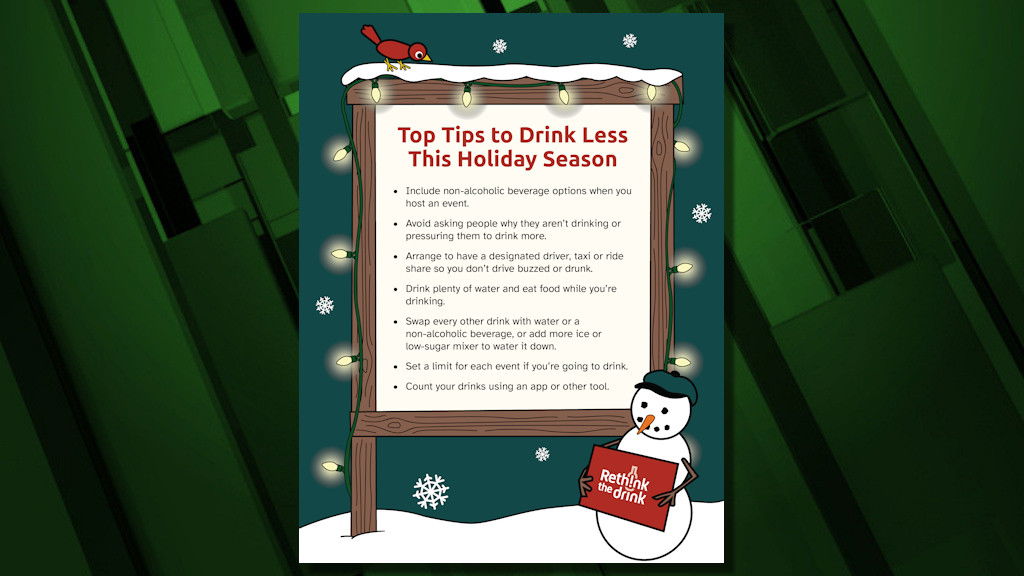‘Rethink the Drink’ is back: Oregon agencies renew campaign urging people against excessive drinking

By Lynne Terry, Oregon Capital Chronicle
SALEM, Ore. (KTVZ) -- With the holidays coming up, Oregon officials are again running a social media, website, audio and TV campaign aimed at curbing excessive drinking.
The “Rethink the Drink” campaign — the fourth in three years — includes videos in English and Spanish showing people drinking in a wide range of situations, including baby showers, interviews with people about how much they drink and posters linking drinking with liver disease and colorectal cancer. The messages will be posted on websites and social media sites, broadcast on television and streamed on audio and video sites.
The idea is to raise awareness of the harms of binge and excessive drinking and to get people to think about their consumption instead of automatically reaching for the next beer, glass of wine or cocktail, especially in social situations where alcohol is flowing.
“In these environments, it’s easy to drink more than you normally might,” said Dr. Tom Jeanne, the Oregon Health Authority’s deputy state health officer epidemiologist. “We can all support one another to drink less, and that includes having healthy and honest conversations about our alcohol use.”
The Oregon Alcohol and Drug Policy Commission, Oregon Liquor and Cannabis Commission, Oregon Department of Transportation and Oregon Health Authority are participating in the campaign, which was first launched in July 2022 and was the first such campaign nationwide by a public health agency. State officials repeated the messages that winter, sponsored another campaign last winter and relaunched the campaign again earlier this month. It will run through Jan. 5.
The campaigns mark the state’s response to the health and financial toll that drinking has on Oregonians and the economy. An ECONorthwest study commissioned by the health authority and published in 2021 shows that the per-capita rate of alcohol consumption in Oregon remained above the U.S. average from about 1990 through 2019, costing the state nearly $5 billion a year in lost wages and productivity, health care expenses, social service costs, traffic accidents and other expenses.
In 2020, nearly one in five people reported binge drinking — four or more drinks on a single occasion or one to two drinks every night — while alcohol-related deaths have risen from nearly 2,090 in 2017 to nearly 3,030 in 2022, the latest year available. Alcohol is also the third leading cause of preventable death and disease in Oregon after tobacco use and inactivity and poor diet.
Alcohol of any type is associated with a host of ills, from cancer, heart and liver disease and stroke to depression, anxiety and memory problems, including dementia.
The more and longer a person drinks, the greater the risk. Holidays pose a heightened threat because they are associated with binge drinking, the most common and costly form of excessive drinking. It impairs judgment, slows reaction times and increases the likelihood of making fatal decisions, like driving. It’s not just an issue for young adults, either: People in their 30s and 40s binge drink at nearly the same rates as younger people, health officials said.
Health officials hope the campaign will encourage people to opt for non-alcoholic drinks at holiday events, or to intersperse drinks with water, and to choose a designated driver if they do drink alcohol.
“If you’re hosting an event this holiday season, offer non-alcoholic beverage options and be sure to have food available for guests,” said Craig Prins, the Oregon Liquor and Cannabis Commission’s executive director.
Jonathan Modie, an OHA spokesman, said the state does not have any data showing an impact of the campaigns, noting that that could take a few years. But agency officials say a study showed that people who’ve seen the messages have reported having more conversations about drinking with their friends and family, have thought more about their drinking habits and were more likely at least to plan on cutting back than those who hadn’t seen or heard any of the ads.
The state’s website continues to attract attention as well, Modie said.
“We have seen a significant increase in views to our Rethink the Drink website, which tells us that people across Oregon want to learn more about excessive alcohol use and join this conversation,” Modie said.